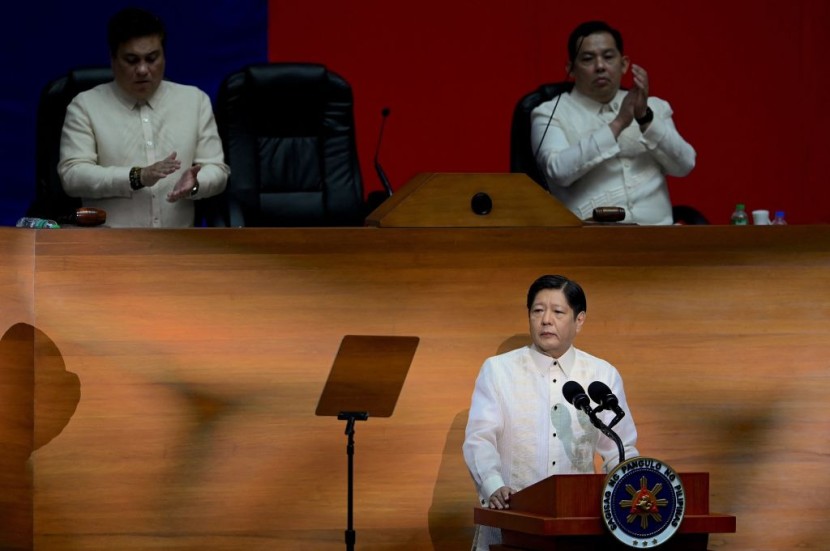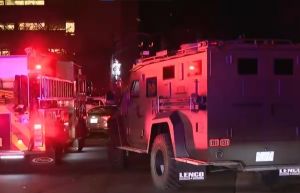
Philippine President Ferdinand Marcos Jr. delivered his second State of the Nation Address Monday (July 24) despite weather concerns and scheduled protests.
The president of the Philippines is required by its constitution to report annually to the legislature, the Philippine Congress, of the state of the archipelago nation.
In brief, Marcos urged Congress to prioritize the following:
Essential tax measures under the Medium-Term Fiscal Framework, including:
Excise tax on single-use plastics
Value-added tax (VAT) on digital services
Rationalization of mining fiscal regime
Motor vehicle user's charge/road user's tax
Military and Uniformed Personnel Pension
Amendments to the Fisheries Code, the Anti-Agricultural Smuggling Act, and the Cooperative Code
New Government Procurement Law
New Government Auditing Code
Anti-financial accounts scamming
A "Tatak-Pinoy" (Proudly Filipino) law
A Blue Economy law
Measures to ease the paying of taxes
Local government income classification
Philippine Immigration Act.
Here are some highlights of Marcos's State of the Nation Address.
Economic Wins and Losses
During his speech, Marcos highlighted inflation as the Philippines' biggest problem brought about by COVID-19 and the Russian invasion of Ukraine, the latter of which affected wheat and oil prices across the world.
"The increase of prices on goods in the past months was felt by the whole world, including the Philippines," the president said in Tagalog.
Marcos added his economic team formulated policies that would become the foundation of the country's economic situation during the rest of his term, which he claimed was mentioned in Malacañang's Medium-Term Fiscal Framework.
As a result, he continued, the Philippine economy experienced a 7.6% increase in 2022, which the government claimed was its highest rate in 46 years. The country hoped to steadily increase its economic growth by 6% to 7% in 2023.
Marcos owed the steady growth to the relaxation of pandemic restrictions and the "booming" e-commerce sector, which contributed PHP 2 trillion ($36.6 billion), or 9.4% of the country's GDP. The Philippines is one of the largest business process outsourcing (BPO) hubs in the world.
He also cited figures from the Central Bank of the Philippines (BSP) stating a decrease in the inflation rate as the economy rejuvenates from COVID restrictions, projecting a 2.9% rating by 2024.
While the gains are significant, the president admitted more needed to be done to increase the country's economic productivity and quality of life, which prompted his administration's Philippine Development Plan. The plan was to allocate 70% of the national budget towards economic and social services, such as food, education, health, jobs, and social protection.
Agricultural Plans
Marcos, who also handles his cabinet's agriculture portfolio, further reported the recent stabilization of food staples like rice, meat, fish, vegetables, and sugar through its KADIWA stores, which became one of the first of his election promises to be materialized. So far, the scheme also strengthened cooperatives and organizations that adopted the concept, the president emphasized.
"With the presence of over 7,000 KADIWA stores across the Philippines, 1.8 million families have benefitted from its affordable goods," he added.
The Marcos administration also aimed to boost local agricultural production through consolidation, modernization, mechanization, and improvement of value chains to improve the sector's 2.2% rise which was recorded in the first quarter of 2023.
Recently, Marcos signed into law the New Agrarian Emancipation Act, which would write off almost $1.04 billion in land-related debt owed by more than half a million farmers as a move to bolster food production.
Marcos also called on Congress to revisit the Philippine Fisheries Code and amend it to guarantee the sustainable development of the country's fisheries sector and harmonize it with environmental balance. He also sought to have the Cooperative Code amended as well to ease and expedite the formation of cooperatives across the country.
Other agricultural priorities Marcos intended to advance include the local development of bio-fertilizer and cloud seeding technologies, distribution of machinery and crop seeds to farmers, eliminating smugglers and hoarders of agricultural goods, and creation of agricultural infrastructures like irrigation, roads, and cold storage facilities.
Water Resource Management
To assure water security for everyone, Marcos further called on Congress to deliberate the feasibility of a new cabinet portfolio called the Department of Water Resource Management out of the current Water Resources Management Office.
"Considering its fundamental importance, water security deserves our special focus," he said. "Our efforts must not be scattershot, but rather, cohesive, centralized, and systematic."
Among the projects the administration wanted to materialize is the rehabilitation of the Marikina River as a water resource for Metro Manila and the province of Rizal in its northeast as the first phase of the New Wawa Dam is being completed a few kilometers upstream of the old one created during the American period.
Infrastructure Development
Another priority Marcos mentioned was the Philippines's infrastructure development program called "Build Better More." Primary projects of the program would cover investments in areas of physical interconnectivity, water resources, agriculture, health, digital connectivity, and energy.
"The underlying logic to our infrastructure development is economic efficiency," the president explained. "We are opening up all gateways to mobilize goods and services at less cost and in less time, and ultimately, to drive the economy."
Some of the projects being proposed include bridges connecting the provinces of Cavite and Bataan at the mouth of Manila Bay in Luzon and between Davao City and Samal Island in Mindanao, as well as a bridge system connecting the islands of Panay, Guimaras, and Negros in the Visayas.
Another major infrastructure development mentioned by Marcos was the North-South Commuter Railway of the Philippine National Railways (PNR). Currently, all services to the province of Laguna in Manila's southeast have been suspended to give way to the construction of elevated railway systems from Laguna to Pampanga, in Manila's northwest.
Marcos intended to finance such projects through the newly-enacted Maharlika Investment Fund, which he signed into law in the lead-up to Monday's annual address.
Green Energy Production
Marcos also tackled his desire to bring electricity to every Filipino home by 2028, when his term expires.
Addressing other matters that could be resolved beyond his term, he expressed his intention to develop the Philippines' renewable energy system by aggressively promoting renewables to provide a 35% share in the power mix by 2030 and half of it by 2040.
"Since last year, an additional 126 renewable energy contracts with a potential capacity of 31,000 megawatts have been awarded," Marcos reported. "To date, we have over a thousand active projects spread all over the country. 299 of these are solar; 187 are wind; 436 hydroelectric; 58 biomass; 36 geothermal; and 9 are ocean-powered."
Additionally, the Manila central government has partnered with the Bangsamoro Autonomous Region in Mindanao Island to explore the jurisdiction's potential energy assets.
Marcos also reported the activation of the Unified National Grid, which would interconnect the grids of the three major areas of the Philippines: Luzon, Visayas, and Mindanao. However, he added, more is needed to be done in conjunction with the National Grid Corporation of the Philippines to optimize the unified grid's performance.
Education, Science, and Maritime Concerns
A perennial problem for the Philippines, the education system is in need of a major overhaul, Marcos addressed. Under Vice President Sara Duterte's watch in the Marcos cabinet's education portfolio, the administration's agenda has put learning recovery at the forefront through its MATATAG Agenda for basic education.
"Taking to heart the lessons of the pandemic, alternative delivery modes and blended learning methodologies have been adopted to ensure unhampered learning," Marcos said. "Additional social safety nets, such as school-based feeding programs, are also being implemented."
Beyond basic education, the president added, the Philippine education sector needed to strengthen and expand its technical-vocational education and training and higher education systems to be at par with the rest of the world.
Another sector Marcos tackled is the improvement of the country's reception to scientific and technological research and development (R&D) through a "culture of innovation."
He also dealt with the seafaring industry and how the Philippines is addressing its maritime education system.
Healthcare Programs
With COVID-19 on the apparent wane, Marcos reported, the Philippines could now focus on improving the health of every Filipino.
Among its other projects, the Philippine Department of Health has launched convergent programs to address hunger and nutrition-related issues in its population, especially children. To this end, the administration reported the launch of its Food Stamp Program (FSP) to supply the nutrition needs of food-poor Filipinos.
The president also urged parents to complete their children's vaccinations at their nearest health centers.
As for public health facilities, Marcos reported an increase in both number and capacity. He highlighted the initiation of the construction of a multi-specialty center in the province of Pampanga to allow people in the northern parts of Luzon to have more accessible facilities for pediatrics, cardiology, kidney treatment, and cancer treatment.
Employment, Foreign Relations, and Digitalization
As the Philippines was recovering from COVID lockdowns, Marcos reported a 95.7% rise in the country's employment rate. Despite this, he admitted more needed to be done to generate more jobs for unemployed and underemployed Filipinos.
"Under the banner of our fast-growing economy, we are aggressive in our investment and business promotions and facilitations," he added. "For that, we have not limited ourselves to the local economy, but have looked to the global economy for partnerships and agreements."
He informed in his speech his administration's intention of forming strategic alliances with other countries to convince them to invest in the Philippines and in Filipinos choosing to work abroad.
One such trip was to Washington, where Marcos met with US President Joe Biden to talk about economic and military deals that would bring thousands of jobs to Filipinos both at home and in their host nations. He also reported his other trips to meet with foreign leaders in the ASEAN region, as well as East Asian and European leaders, to pitch the country's potential as a technological, e-commerce, and tourism powerhouse in Southeast Asia.
The Philippine government is also pushing to digitize its systems, Marcos stated, insisting that digitalization was "the call of today" and has reported the government's expanding digitalization capabilities.
"It is here. It is needed, and it is needed today," he stressed.
Other Matters
Marcos also reported on the government's objectives to provide housing to every Filipino family, climate change and the reduction of carbon footprint, and disaster and emergency response and management. The address also reported on the developments regarding the joint efforts of the central and Bangsamoro governments to rehabilitate the city of Marawi after it was held hostage by Islamic State-aligned terrorists in 2017.
He also urged Congress to smoothen the government's procurement system and auditing code, as well as the devolution of certain matters away from Manila and into various local governments. He also reported on the modernization and strengthening of the Armed Forces and National Police to curb local insurgencies and crimes, respectively.
Marcos concluded his address saying the state of the nation remained "sound" and improving.
"A New Philippines has come," he concluded.
Who Attended?
Alongside lawmakers from both houses of Congress, among the attendees of the annual event were Vice President Duterte, as well as former presidents Joseph Ejercito Estrada and Gloria Macapagal-Arroyo.
Also present are the members of Marcos's cabinet and members of the diplomatic corps, including the Papal Nuncio to the Philippines, the Most. Rev. Charles Brown, who acts as its dean.
Marcos's predecessor, Rodrigo Duterte, reportedly skipped the event and is resting in his hometown, Davao City, due to his previous visit to China, according to his longtime aide and incumbent senator Christopher Lawrence Go.
Read the full text of Marcos's 2023 State of the Nation Address here.
© 2025 HNGN, All rights reserved. Do not reproduce without permission.








